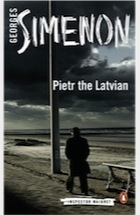
Fiona Griffiths is a quirky, endearing new protagonist in crime fiction
The first thing you should know about the Fiona Griffiths books is that they're told in the first person by a a very unusual young woman, a Detective Constable in the Cardiff, Wales, police force.
Sometime in her childhood, Fiona suffered a deeply traumatic event, but exactly what happened is buried deep in her subconscious. Like a virus, though, it flares up from time to time, and in an unusual way. Fiona's post-traumatic stress flare-ups take the form of Cotard's syndrome, a condition in which dissociation and depression combine to make her lose touch with her physical and emotional feelings, turn the world into shades of gray and, at its worst stages, make her believe she is literally dead.
When I first heard about this new series featuring a lead with such an bizarre condition, I was a little put off. I thought this sounded like too much of a gimmick. But author Harry Bingham doesn't use it that way. Fiona's condition isn't something that her co-workers even know about. They definitely think she's odd, but that's because she's a Cambridge University graduate, has a contrary and smartarse personality, and a knack for pushing other people's buttons--even people a lot higher up in the police hierarchy.
Readers only know about Fiona's condition because we hear her thoughts. Even though she's doing her best to be a resident of "Planet Normal," as she calls it, she knows that other detectives don't relate to, and even commune with the dead, as she does. And that's quite an accomplishment in the sensational case that is the focus of this second book (Delacorte, February 18, 2014) in the Fiona Griffiths series: the murder, dismemberment and scattering of body parts of two young people.
In her spare time, Fiona has two other cases occupying her time---and a whole room in her house. One is finding out the trauma from her past and the other, in connection with the sex trafficking ring crime from the first book, tracking down others who may have been in the ring but hadn't been arrested.
The murder/dismemberment case (which the team, with macabre humor, calls Stirfry) is a tough one to solve. Readers who enjoy police procedurals should appreciate those elements in this story, and thriller lovers will enjoy some well-executed white-knuckle scenes.
But the biggest rewards of reading these books are for those who most appreciate character-driven stories and evocative writing. For all her oddities, Fiona is an endearing character; smart, funny, both tough and tender. She's someone I'm looking forward to getting to know better in future books--along with the series' many other intriguing secondary characters, such as Fiona's father, long thought to be kingpin of a Cardiff organized crime ring; her fire-breathing boss, Detective Superintendent Watkins; and her boyfriend Buzz, for whom she works hardest to stay a resident on Planet Normal.
While it would be best to read the first book in the series, Talking to the Dead, before reading this one, it's not absolutely necessary.
Note: Thanks to the publisher and Amazon's Vine program for an advance reviewing copy of the book.







